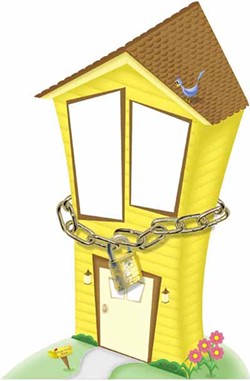You can add another casualty to the mess created by subprime mortgage lending. Charlotte-Mecklenburg Schools are projecting the system could see more than 3,000 homeless children when schools open this month -- a 17 percent increase since June.
Laurie Schwartz, development director with A Child's Place, a nonprofit that works closely with CMS, said officials counted 2,493 homeless children enrolled in the school system two months ago. That's a 13 percent increase from June 2007, and a 35 percent increase from the June prior.
Charlotte's housing market has held up strong compared to many metropolitan areas. Cleveland, for instance, last school year saw a more than 30 percent increase in the number of homeless children the school system serves. Charlotte schools only started seeing the effects of the mortgage crisis late last year. "We anticipate we haven't seen the big influx yet," Schwartz said.
The effects of the mortgage crisis on children have received relatively little attention. First Focus, a Washington, D.C., children's advocacy group, has been trying to change that. In May, the nonprofit released a report estimating that 1.95 million children nationwide -- including 39,400 N.C. children -- will be affected by mortgage woes.
"We anticipate that the situation is certainly going to be worse," said Phillip Lovell, the group's vice president for education policy. "We don't know how many of those kids are going to be homeless, but we know that a number of them will."
First Focus found that school systems across the country are experiencing increases in the number of homeless children in their classrooms, bringing with them the potential for a host of problems. Children affected by the mortgage crisis are more likely to move around, which federal studies say hurts academic performance. They're more likely to be held back and eventually drop out. A U.S. Department of Education study found that third-graders who changed schools frequently were 2.5 times more likely than their peers to repeat a grade. Economic troubles could reduce access to health care; family strain may lead to home violence.
Families rendered homeless after subprime-related foreclosures differ from A Child's Place's usual clients. While A Child's Place usually works with students from working-poor families, foreclosed-upon families are slightly better-off financially, Schwartz said: "They are going to be less prepared than our clients are typically -- which is not prepared -- to be living without stable housing. ... It's hard to ask for help. It's hard to accept help. It hurts your pride a lot. And we anticipate that's going to be even more the case."
Since Schwartz started working at A Child's Place three-and-a-half years ago, the agency has more than doubled the number of schools with social work teams based on-site. The agency, which relies on private donations, has received a $98,000 grant from the Women's Impact Fund, a local philanthropy, to meet growing need. Annabelle Suddreth, executive director of A Child's Place, fears agency donations could decline. "People are having to make hard decisions this year."
First Focus has called for Congress to give more tax money to the McKinney-Vento Education program, which attempts to address the needs of homeless students. The program allows homeless children to stay in their home schools even if forced to move to an emergency shelter outside of their district, and it provides such students with help such as tutoring, counseling and supplies.
The recent housing bill that President Bush signed last week included an extra $30 million specifically to help children left homeless by the foreclosure crisis, Lovell said. Though the measure hasn't yet been funded, First Focus is hopeful money will be included in a supplemental appropriations bill this fall.
Oddly, Lovell said, some children who lose their homes will qualify for one McKinney-Vento program but not another HUD-related program. Under McKinney-Vento, children are counted as homeless if they live on the streets, in cars, in shelters, transitional housing programs, pay-by-the-week motels or are doubled-up with family or friends. The U.S. Department of Housing and Urban Development, however, doesn't consider children homeless if their families are staying with friends or extended family. "So they can stay in [their home] school, but they can't get shelter [aid] -- as bizarre as that sounds," Lovell said.
Some experts have even suggested that education needs played a role in creating the mortgage crisis. Robert H. Frank, an economist at Cornell University and author of Falling Behind: How Rising Inequality Harms the Middle Class, has written that part of the mortgage crisis can be explained by families' desires to enroll their children in better school districts -- school districts that often had higher-priced homes. "And because the best schools are in the most expensive neighborhoods, the imperative was clear: To gain access to the best possible public school, you had to purchase the most expensive house you could afford," he wrote in an April 27 column in The Washington Post.
Lovell hopes children's needs will play a bigger role in mortgage policy discussions. "We've got to make these kids much more of a priority," Lovell said. "Otherwise, we'll be paying a lot more in the long-term."
Latest in News Feature
More by Karen Shugart
-
Mecklenburg and beyond ...
Feb 10, 2009 -
Mecklenburg and beyond ...
Feb 9, 2009 -
Mecklenburg and beyond ...
Feb 6, 2009 - More »
Calendar
-

Wine & Paint @ Blackfinn Ameripub- Ballantyne
-

Queen Charlotte Fair @ Route 29 Pavilion
-

NEW WINDOW GALLERY-Pat Rhea-ACRYLIC PAINTINGS-April 05-30 2024 VALDESE, NC 28690 @ New Window Gallery/Play It Again Records
- Through April 30, 12 p.m.
-

TheDiscountCodes
-

Face to Face Foundation Gala @ The Revelry North End
-
Esports in Charlotte Takes Off: A Guide to Virtual Competitions and Betting
-
Canuck in the Queen City 7
A Canadian transplant looks back at her first year as a Charlotte resident
-
Homer's night on the town 41
If you drank a shot with the Knights mascot on Sept. 20, you were basically harboring a fugitive










